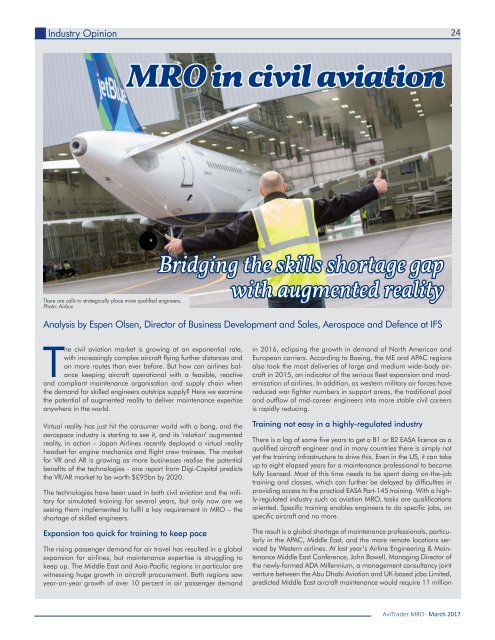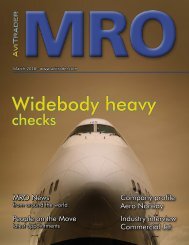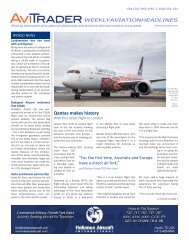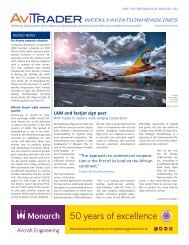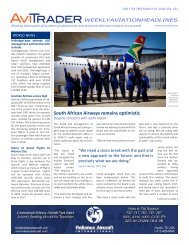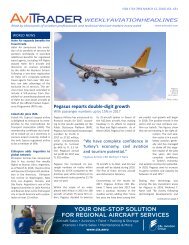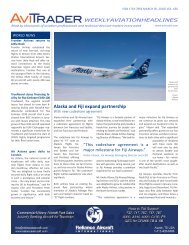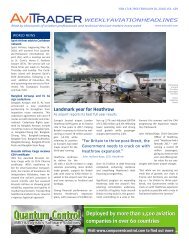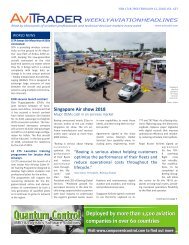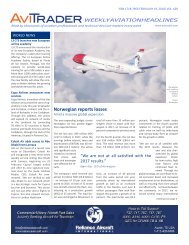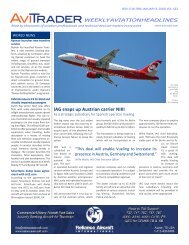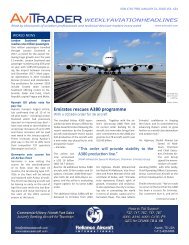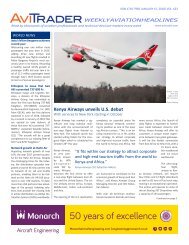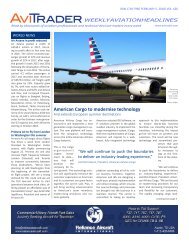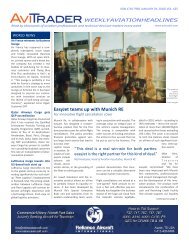AviTrader MRO Magazine 2017-03
AviTrader MRO Magazine 2017-03
AviTrader MRO Magazine 2017-03
You also want an ePaper? Increase the reach of your titles
YUMPU automatically turns print PDFs into web optimized ePapers that Google loves.
Industry Opinion<br />
24<br />
<strong>MRO</strong> in civil aviation<br />
There are calls to strategically place more qualified engineers.<br />
Photo: Airbus<br />
Bridging the skills shortage gap<br />
with augmented reality<br />
Analysis by Espen Olsen, Director of Business Development and Sales, Aerospace and Defence at IFS<br />
The civil aviation market is growing at an exponential rate,<br />
with increasingly complex aircraft flying further distances and<br />
on more routes than ever before. But how can airlines balance<br />
keeping aircraft operational with a feasible, reactive<br />
and compliant maintenance organisation and supply chain when<br />
the demand for skilled engineers outstrips supply? Here we examine<br />
the potential of augmented reality to deliver maintenance expertise<br />
anywhere in the world.<br />
Virtual reality has just hit the consumer world with a bang, and the<br />
aerospace industry is starting to see it, and its ‘relation’ augmented<br />
reality, in action – Japan Airlines recently deployed a virtual reality<br />
headset for engine mechanics and flight crew trainees. The market<br />
for VR and AR is growing as more businesses realise the potential<br />
benefits of the technologies - one report from Digi-Capital predicts<br />
the VR/AR market to be worth $£95bn by 2020.<br />
The technologies have been used in both civil aviation and the military<br />
for simulated training for several years, but only now are we<br />
seeing them implemented to fulfil a key requirement in <strong>MRO</strong> – the<br />
shortage of skilled engineers.<br />
Expansion too quick for training to keep pace<br />
The rising passenger demand for air travel has resulted in a global<br />
expansion for airlines, but maintenance expertise is struggling to<br />
keep up. The Middle East and Asia-Pacific regions in particular are<br />
witnessing huge growth in aircraft procurement. Both regions saw<br />
year-on-year growth of over 10 percent in air passenger demand<br />
in 2016, eclipsing the growth in demand of North American and<br />
European carriers. According to Boeing, the ME and APAC regions<br />
also took the most deliveries of large and medium wide-body aircraft<br />
in 2015, an indicator of the serious fleet expansion and modernisation<br />
of airlines. In addition, as western military air forces have<br />
reduced war fighter numbers in support areas, the traditional pool<br />
and outflow of mid-career engineers into more stable civil careers<br />
is rapidly reducing.<br />
Training not easy in a highly-regulated industry<br />
There is a lag of some five years to get a B1 or B2 EASA licence as a<br />
qualified aircraft engineer and in many countries there is simply not<br />
yet the training infrastructure to drive this. Even in the US, it can take<br />
up to eight elapsed years for a maintenance professional to become<br />
fully licensed. Most of this time needs to be spent doing on-the-job<br />
training and classes, which can further be delayed by difficulties in<br />
providing access to the practical EASA Part-145 training. With a highly-regulated<br />
industry such as aviation <strong>MRO</strong>, tasks are qualifications<br />
oriented. Specific training enables engineers to do specific jobs, on<br />
specific aircraft and no more.<br />
The result is a global shortage of maintenance professionals, particularly<br />
in the APAC, Middle East, and the more remote locations serviced<br />
by Western airlines. At last year’s Airline Engineering & Maintenance<br />
Middle East Conference, John Bowell, Managing Director of<br />
the newly-formed ADA Millennium, a management consultancy joint<br />
venture between the Abu Dhabi Aviation and UK-based jcba Limited,<br />
predicted Middle East aircraft maintenance would require 11 million<br />
<strong>AviTrader</strong> <strong>MRO</strong> - March <strong>2017</strong>


